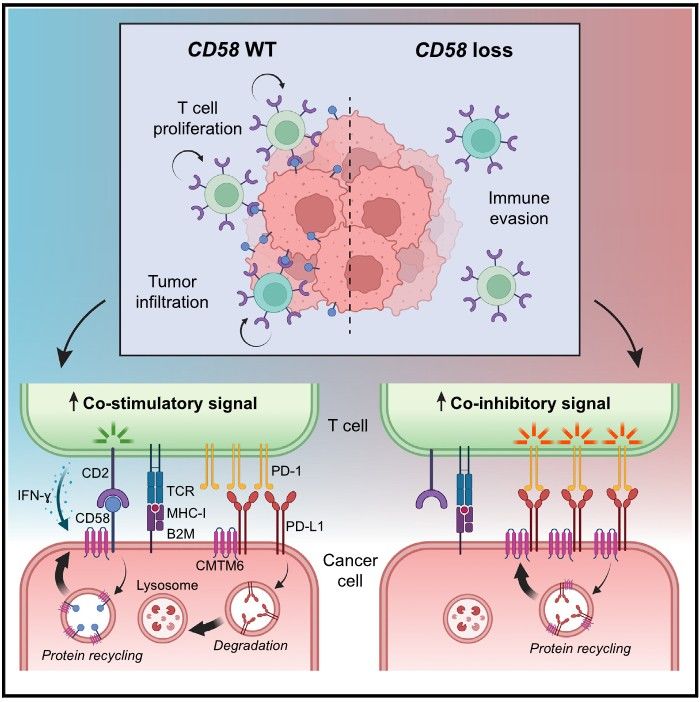CD2 (Cluster of Differentiation 2) is a cell surface glycoprotein expressed primarily on T lymphocytes and natural killer (NK) cells. It plays a critical
role in immune cell activation, cell-cell interactions, and immune responses. CD2 is a member of the immunoglobulin superfamily and acts as an important
co-stimulatory receptor during immune responses. It facilitates communication between immune cells and enhances T-cell activation, playing a critical role
in the adaptive immune system. Because of its immunomodulatory function, targeting CD2 offers potential therapeutic applications in autoimmune diseases,
graft-versus-host disease (GVHD) and cancer.
NCBI Gene ID: 914
UniProtKB ID: P06729
Structure and Function of CD2
CD2 is a single-chain transmembrane protein with an extracellular domain consisting of two immunoglobulin-like domains. The extracellular portion of CD2
interacts with its ligands, such as CD58 (also known as LFA-3), which is expressed on antigen-presenting cells (APCs). This interaction is critical for the
adhesion and activation of T cells and NK cells. CD2 is part of a larger group of adhesion molecules that contribute to the formation of immune synapses
during antigen recognition.
Key functions of CD2 include:
-
T cell activation: CD2 enhances T cell activation through its interaction with CD58. This co-stimulatory
signal promotes the full activation of T cells and the subsequent production of cytokines, such as interleukin-2 (IL-2).
-
Cell adhesion: CD2 helps T cells adhere to other cells (such as APCs) during the immune response. It plays a role in the formation of
the immunological synapse, a structure that forms between a T cell and an antigen-presenting cell and is critical for effective T cell activation.
-
Signal transduction: Upon ligand binding, CD2 transmits intracellular signals that promote immune responses, such as T cell
proliferation, differentiation, and cytotoxicity.
CD2 in Immune Responses
CD2 plays a central role in both adaptive immunity and innate immunity:
-
In Adaptive Immunity: CD2 is expressed on mature T cells and plays a role in the initial activation of T cells when they encounter
antigen-presenting cells. CD2 signaling helps to amplify the immune response by promoting T cell proliferation and cytokine production.
-
In Innate Immunity: CD2 is also expressed on NK cells, which are involved in the body's innate immune response to viral infections and
tumors. By interacting with its ligand, CD58, CD2 contributes to NK cell activation and cytotoxicity.
 Figure 1. The CD58-CD2 axis is co-regulated with
PD-L1 via CMTM6 and shapes anti-tumor immunity. (Ho et al., 2023)
Figure 1. The CD58-CD2 axis is co-regulated with
PD-L1 via CMTM6 and shapes anti-tumor immunity. (Ho et al., 2023)
CD2 and Disease Pathogenesis
-
Autoimmune Diseases: CD2 has been implicated in several autoimmune diseases, including psoriasis and rheumatoid arthritis. Its role in
T-cell activation contributes to excessive immune responses leading to tissue inflammation and damage. Therapeutics targeting CD2, such as
alefacept, are designed to modulate immune responses and reduce disease severity.
-
Graft-versus-Host Disease (GVHD): CD2-mediated immune activation is a key factor in GVHD following allogeneic hematopoietic stem cell
transplantation. Targeting CD2 can mitigate T cell-mediated damage and improve transplant outcomes.
-
Cancer: CD2-expressing T and NK cells play a role in tumor immunity, but abnormal T cell activation can contribute to malignancies.
CD2-targeted therapies such as inotuzumab ozogamicin offer promising cancer treatment options by
modulating immune responses.
CD2 as a Drug Target
-
Alefacept: A recombinant fusion protein combining the extracellular CD2-binding domain of leukocyte function-associated antigen-3 (LFA-3) with the Fc region of
human IgG1, was the first CD2-targeted therapy approved by the FDA. By binding to CD2 on memory effector T cells, Alefacept disrupts CD2-CD58
interactions, inhibits T cell activation and induces apoptosis via antibody-dependent cellular cytotoxicity (ADCC).
-
Teceleukin (Recombinant IL-2): A recombinant interleukin-2 (IL-2), activates CD2+ T cells and NK cells by binding to high-affinity IL-2
receptors. IL-2 signaling upregulates CD2 expression, which enhances T cell proliferation and cytotoxicity. This indirect CD2 modulation has been
exploited in cancer immunotherapy. Teceleukin is approved for metastatic melanoma and renal cell carcinoma. By expanding tumor-infiltrating lymphocytes
(TILs), it enhances anti-tumor immunity and achieves durable responses in 10-20% of patients. However, its utility is limited by severe capillary leak
syndrome and off-target activation of regulatory T cells (Tregs).
In summary, CD2 is a key player in the immune system, essential for the activation and regulation of T cells and NK cells. Through its interaction with CD58
and involvement in immune signaling, CD2 facilitates immune responses critical for fighting infections and malignancies. Its clinical relevance makes it a
potential target for therapeutic interventions in a range of diseases, from autoimmune disorders to cancer.
At Creative BioMart, we offer cutting-edge therapeutic proteins such as
alefacept and teceleukin,
contact us today for more details!
References
- Binder C, Cvetkovski F, Sellberg F, et al. CD2 immunobiology. Front Immunol. 2020;11.
-
Ho P, Melms JC, Rogava M, et al. The CD58-CD2 axis is co-regulated with PD-L1 via CMTM6 and shapes anti-tumor immunity. Cancer Cell.
2023;41(7):1207-1221.e12.
 Figure 1. The CD58-CD2 axis is co-regulated with
PD-L1 via CMTM6 and shapes anti-tumor immunity. (Ho et al., 2023)
Figure 1. The CD58-CD2 axis is co-regulated with
PD-L1 via CMTM6 and shapes anti-tumor immunity. (Ho et al., 2023)